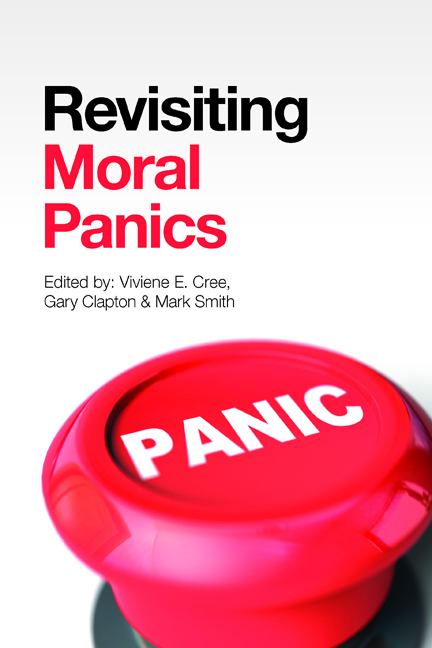Book contents
- Frontmatter
- Contents
- Contributors
- Preface
- Commentary moral panics yesterday, today and tomorrow
- Part One Gender and the family
- Part Two Moral panics in our time? Childhood and youth
- Part Three The state, government and citizens
- Part Four Moral crusades, moral regulation and morality
- Afterword the moral in moral panics
- Conclusion Moral panics and beyond
- Index
Thirteen - Moralising discourse and the dialectical formation of class identities: the social reaction to ‘chavs’ in Britain
Published online by Cambridge University Press: 08 March 2022
- Frontmatter
- Contents
- Contributors
- Preface
- Commentary moral panics yesterday, today and tomorrow
- Part One Gender and the family
- Part Two Moral panics in our time? Childhood and youth
- Part Three The state, government and citizens
- Part Four Moral crusades, moral regulation and morality
- Afterword the moral in moral panics
- Conclusion Moral panics and beyond
- Index
Summary
Introduction
They are the non-respectable working-classes: the dolescroungers, petty criminals, football hooligans and teenage pram-pushers. (Lewis, 2004).
Since the early 2000s, the ‘chav’ has become a widely spread stereotype, well-institutionalised into British public and everyday discourse (le Grand, 2013). The term is tied to strong forms of hostility and moralaesthetic distinction, and commonly applied to white working-class youths appropriating a certain style of appearance, including what is known as ‘streetwear’ clothing and jewellery. Drawing on an analysis of news media, websites and popular culture, this chapter discusses the social reaction to chavs and how it is bound up with the formation of class identities.
Following calls to extend the conceptual reach of moral panic analysis (Hier, 2002, 2008, 2011; Critcher, 2009, 2013; Hier et al, 2011; Hunt, 2011), I conceptualise moral panic as a strong and volatile type of social reaction rooted in long-term processes of moral regulation. Both moral panic and moral regulation are conceived as moralisation processes that entail the formation of moralising discourses that act upon the conduct of both self and other. Moralisation therefore involves a dialectical relationship between those actors who moralise certain issues and those who are the object of such moralising discourses and practices. However, Critcher (2009) states that while moral panic discourses focus on constructing the ‘folk devil’ as a threat to the moral order and an object of social control measures, moral regulation projects typically involve processes of moral governance, or the reformation of ‘character’ or the adaptation of behaviour.
In this chapter, I explore the ways in which such dialectical processes of moralisation are tied to the formation of class identities, and to this end I draw on a multi-dimensional, relational notion of class informed by Bourdieu (1984 [1979], 1986, 1987). Bourdieu argues that classed forms of identification and distinction are tied to individuals’ unequal access to economic, cultural and social capital; individuals from different classed social locations have differing possibilities to construct identities that are valued and recognised in society. Class formation is therefore tied to hierarchies of moral worth (Skeggs, 1997; Sayer, 2005).
The social reaction to chavs
The emergence and diffusion of the chav stereotype in many ways follows that of a classic moral panic.
- Type
- Chapter
- Information
- Revisiting Moral Panics , pp. 159 - 168Publisher: Bristol University PressPrint publication year: 2015



